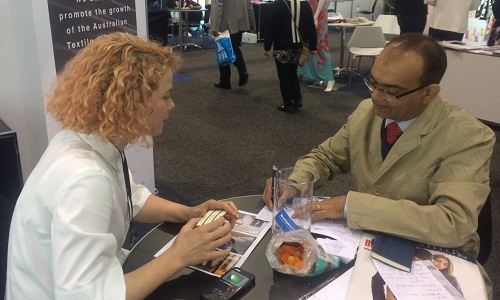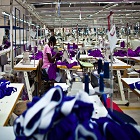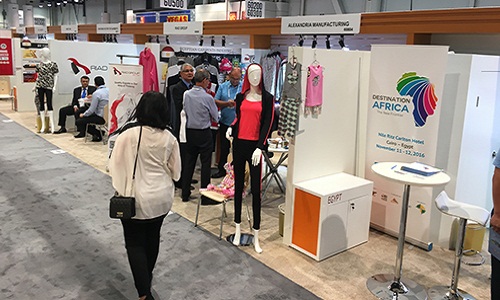FW
The currency crisis threatens to have serious effects on the economy. Due to the cash crunch, it has become difficult for garment units in Ludhiana to buy raw material, pay bills and make payments to laborers. The major problem is shortage of labor. Workers have stopped coming to factories because they haven’t been paid. Or they are lining up outside banks to get their notes exchanged. Either way production has been hit. Employers themselves have not been able to withdraw adequate cash for managing factory expenditures.
Garment exporters are facing canceled orders due to delays in production and drop in orders from local or multinational brands. Leading brands have cut down their orders. It is feared that exports of garments from Ludhiana’s micro, small and medium enterprises can drop by 30 to 40 per cent.
Apart from the labor crisis, the supply of raw material from vendors has been hit due to the cash problem. Manufacturers fear this disastrous situation is going to hurt their businesses badly and that they have to suffer heavy losses.
Ludhiana is a leading producer of woolen and acrylic knitwear although it also uses extensively cotton and other blended fibers to produce a wide range of fabrics, hosiery, knitwear and readymade garments.
Gap is falling into irrelevance. And to think the clothing store opened in the US in the ’60s with reference to the rift between young idealistic children and their conservative suit-and-long-skirt wearing parents. At the time Gap provided young hippies with all their indigo denim needs.
Now Gap’s three-tier brand model — Old Navy for the budget buyer, Banana Republic for the upscale shopper and Gap stores for everyone else — isn’t working as well as it used to. Over the past year there has been a three per cent decline for Old Navy, a four per cent drop for Gap and an 11 per cent plunge for Banana Republic.
Same-store sales have fallen specifically at Gap stores for ten consecutive months. Banana Republic has fared worse with 20 consecutive months of declining sales as it struggles to figure out what women in particular want in high-end workplace attire.
Gap’s total sales for the three months ended October 31 were flat compared with the same period last year. The retailer plans to close 140 of its 675 North American stores and shed 250 corporate jobs by the end of January. Gap has been overtaken by fast fashion retailers like H&M, Zara and Forever 21 that have lured younger shoppers.
Denim Première Vision Paris took place on November 2nd and 3rd, 2016. The show was deemed a success by most mills, brands and designers. It offered the latest fabrics and sustainability initiatives designed to make denim stand out. Denim connoisseurs were given the opportunity to browse and buy a selection of the finest vintage garments.
Emerging trends and future challenges affecting the growing and increasingly complex industry were discussed. It was argued that price focus was causing a stasis in trends and development. For instance stretch has been the main look for more than a decade. It was suggested that authentic, rigid denim fabrics could offer more potential for creativity and newness.
The price-quality ratio was underlined, particularly for premium denim brands competing against fast fashion rivals. If something was being retailed at a high price, it needs to look as if it costs that much, not like something that can be picked up at a fast fashion retailer for a third of the price.
Sustainability and limiting environmental impact was a big part of many exhibitors’ presentations. So there were firms showcasing yarn made with recycled fibers or denim made using 100 per cent Better Cotton Initiative cotton. Prosperity Textile has become the first Chinese denim mill to join the Bluesign environmental system.
"One of the features of this edition of ISEA has been the support of the Council of Textile & Fashion. This is an industry body which exists to promote the growth of the industry in Australia. It helps members strengthen their local and off-shore supply chains."

One of the features of this edition of ISEA has been the support of the Council of Textile & Fashion. This is an industry body which exists to promote the growth of the industry in Australia. It helps members strengthen their local and off-shore supply chains.
It's a not for profit organisation with 65 years of service to the industry, and members are drawn from across the fashion and textile industry.

Its focus areas are growing exports, navigating start ups, harnessing innovation, helping supply chains get globalised in order to optimize and supporting ethical practices. It supports and guides local industry to help grow their business.
Key supporting activities are training networks, organizing workshops and seminars, tailored and accredited training.
Among its other initiatives are setting industry policy and showcasing emerging designers. It gives an immense opportunity to young budding designers to showcase in this very progressive nternational show.
It connects with international industry and potential collaborators and adds a lot of academic value to the event. The council conducted three academic sessions in the seminar section in the following order. One was conducted on the first day of the show and the remaining two were lined up for the last day.
"The Council of Leather Exports has participated for the first time in ISEA with 18 booths. It came to ISEA with the objective of creating both forward and backward linkages. It has got forward linkages through visitors from Australia and New Zealand. As for backward linkage it has initiated discussions for sourcing very high quality cow skin. Going forward it has plans to take a delegation to Australia to take this opportunity to its logical conclusion."

The Council of Leather Exports has participated for the first time in ISEA with 18 booths. It came to ISEA with the objective of creating both forward and backward linkages. It has got forward linkages through visitors from Australia and New Zealand. As for backward linkage it has initiated discussions for sourcing very high quality cow skin. Going forward it has plans to take a delegation to Australia to take this opportunity to its logical conclusion.
The current scenario is that India exports roughly 70 per cent to the EU and 10 per cent to the US. Opportunities are being explored in Latin American countries.
Since India’s quality standards are moving up, the country is expecting to taking over some share from Chinese suppliers.
The leather industry is broadly a labor intensive sector and presently the council is scaling up, improving notably in its designing capability.
The Council of Leather Exports participates in fairs in Japan, Italy, Las Vegas, Turkey, Germany, Russia, China, Hong Kong.
The Indian leather industry accounts for around 12.9 per cent of the world’s leather production of hides/skins. The country ranks second in terms of footwear and leather garment production in the world. India’s leather industry has grown drastically, transforming from a mere raw material supplier to a value-added product exporter.
"Looking for promising growth havens, companies are exploring newer markets having immense potential. One of the emerging markets is Africa. Big brands are investing and those that have already invested are looking at expanding. At the first edition of the Destination Africa sourcing show held recently in Cairo, 85 exhibitors from around the continent got together to display their products and offerings with major brands from the US and Europe."

Looking for promising growth havens, companies are exploring newer markets having immense potential. One of the emerging markets is Africa. Big brands are investing and those that have already invested are looking at expanding. At the first edition of the Destination Africa sourcing show held recently in Cairo, 85 exhibitors from around the continent got together to display their products and offerings with major brands from the US and Europe.
Dina Abdel Aziz, project director for Destination Africa points out when they thought about ‘Destination Africa’, the aim was to attract the attention of buyers of Africa as a region, not only Egypt. Especially now that prices are increasing in China, an awareness needs to be crated among buyers on emerging regions in Africa.
Egypt, the new frontier
Egypt doesn’t benefit from duty free access to the US market under the Africa Growth and Opportunity Act (AGOA) but it does enjoy the same duty free trade privileges under the Qualifying Industrial Zone (QIZ) programme. Alex Apparels, the manufacturing arm of Alpine Creations in Egypt, has been making product for Walmart for 22 years and the retailer is confident in the company’s abilities, it taps into its design and technology expertise to guide the product it puts in its stores.
Walmart makes up half of Alex Apparel’s customer base, but the company also supplies to Under Armour, Hanes and Carters/Oshkosh, with 80 per cent of its business in knits and the other 20 per cent in wovens. The products are manufactured in five factories in the Alexandria City region of Egypt. The company has also started building its own mill in Egypt to be less reliant on fabric sourcing from Asia, and is aiming for eventual vertical integration. This will eventually shorten supply time and increase flexibility.
Kenya, an upcoming destination
When one is looking at Africa, Kenya comes into immediate limelight. The country is primed for taking on more manufacturing—not to mention its duty-free benefits under AGOA. Stability and guaranteed quality are among the two main aspects that are offering growth avenues towards Kenya. There is an easy availability of manpower and training the manpower is equally easy. The country’s ranking of ease of doing business has been improving steadily since the past few years. The minimum wage for workers in Kenya is roughly $100 per month, and though it’s a little higher than some of its neighbouring nations, manufacturers there are not in the business of giving buyers goods that are low quality and over-priced.
Lesotho, a promising destination
Lesotho is another other promising countries to do business with as it enjoys access to the US and EU markets duty free, a reasonably low cost of doing business and the potential to fulfill demands of customers. The manufacturing sector is the second biggest employer after the government, according to Puseletso Makhakhe, investment services manager for the Lesotho National Development Corporation (LNDC). The country has stable political and social environment. No labour unrest has been reported so far by companies operating out of Lesotho. The current minimum wage for unskilled workers is around $80 a month, and for skilled workers, the rate jumps to $100 a month.
Suddenly sea waste has become valuable as apparel companies are using it to create new products. Adidas for example, is selling shoes made mostly of plastic collected off the coast of the Maldives. A swimsuit line from Volcom is largely made from recycled nylon materials, including abandoned fishing nets.
Sportswear companies are putting ocean trash back to work – recovering, recycling, and repurposing materials for use in shoes, jerseys, and swimsuits. The ultimate ambition is to eliminate virgin plastic from their supply chain. Water bottles, grocery bags, and nylon fishing nets persist far longer than we can use them, and when they’re not properly recycled, they can end up killing marine life.
About 12 million tons of plastic trash end up in the world’s oceans every year. The up cycling-plastic practice is about taking action and implementing strategies that can end the cycle of plastic pollution for good. So the fact that Volcom’s swimsuits are made with recovered fishing nets creates a natural connection to surf culture, which fully understands the value of keeping the ocean clean.
Some 6,40,000 tons of fishing gear are lost or abandoned each year, leading to the deaths of an untold number of fish, sharks, sea turtles, dolphins, and other wildlife. One apparel company is recycling ten million pounds of fishing nets annually, mainly to make yarn for carpets.
Spanish brand Zara is leading the fashion industry in its home country. In terms of unique customers, Zara is the absolute leader in Spain. During July, the Spanish retailer welcomed over 2, 53,000 customers, while the number two on the list, Asos, stays behind with 1,05,000 buyers. Zalando and Pull & Bear are other popular online fashion destinations for Spanish consumers.
Zara is the flagship brand of the Inditex Group. Zara also has the best conversion rate in the Spanish online fashion sector. Its conversion rate is 12 per cent, which is more than its competitors Asos (nine per cent) or Massimo Dutti (nine per cent). Zalando, the biggest online fashion retailer in Europe, welcomed more unique visitors in July than Zara, but ended with a conversion rate of three per cent.
In Spain, more than half a million people shopped fashion online during the month of July this year. An average order of clothing and accessories was worth 57 euros. Especially, Zara was a popular shopping destination, followed by Asos and Zalando.
A majority (56 per cent) of online fashion shoppers in Spain is female, while the share of women is even higher (69 per cent) when we look at the amount of money spent on fashion online.
Textiles manufacturer and exporter Welspun’s net sales grew 19 per cent in the September quarter. It posted a net loss of Rs 147.52 crores. Welspun’s total income from operations jumped 22 per cent in July to September 2016 from the same quarter last year. The company achieved its highest quarterly top line during the quarter.
The company has taken a one-time hit of Rs 501 crores with regard to the traceability issue in Egyptian cotton. Despite a 18.2 per cent revenue growth in the first half of 2016-17, Welspun forecast flat revenue for the full financial year. It plans to become a zero debt company by 2020 by shedding its Rs 2,500 crores debt.
Welspun plans to expand its focus on branded and innovative products to become a two billion dollar company in four years, with 20 per cent revenue coming in from domestic sales. It will set up a Rs 600 crores carpet plant near Anjar in 18 months. The investment will be met through internal accruals and debt. The company also plans to spend Rs 600 crores over 18 months spread over financial year 2018 and 2019 to make carpets and rugs. The company’s credit ratings have also been reaffirmed.
Ahmedabad-based Nandan Denim’s net profit rose 4.42 per cent for the second quarter of 2016-17. The company is poised to be Asia’s largest denim fabric manufacturer. Net sales for the second quarter were higher by 2.75 per cent. EBITDA and PAT margins were 16.23 per cent and 5.38 per cent. EPS stood at Rs 3.39 at a face value of Rs 10 per share.
For the six months ended September 2016, the company’s net profit rose 3.73 per cent. Net sales in the first half of 2016-17 were higher by 4.88 per cent compared to the first half of the previous fiscal. For the first half of 2016-17, EBITDA margin stood at 16.21 per cent and PAT margin at 5.35 per cent.
Nandan, opened in 2004 has a capacity for 120 million meters a year. It makes products from three ounce to 15 ounce. It has backward integration of spinning and fancy attachments. It has economies of scope and scale. It gets value addition from fabrics. Its response time is fast.
Nandan wants to shift from being a denim manufacturer to a fashion driven brand. It wants growth with value. The group turnover last year was two and a half thousand crores and Nandan’s share was Rs 1200 crores.













